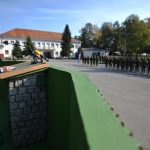Foreign Minister Stier participates in a meeting of NATO foreign ministers.
Croatia has already started to increase its defence budget, which is this year nine percent larger compared to last year, in line with the guidelines from the 2014 NATO summit when it was agreed that all allies should increase their spending on defence to least two percent of GDP, said on Friday in Brussels Croatian Foreign Minister Davor Ivo Stier, reports Index.hr on March 31, 2017.
“These guidelines were agreed at the summit in Wales in 2014 and we have already started to increase defence appropriations. The goal is that all allies should achieve the objective of spending two percent of GDP on defence by 2024,” said Stier, who is participating in a meeting of NATO foreign ministers.
US Secretary of State Rex Tillerson, who attended the NATO meeting for the first time, has called on all allies to meet the target allocation of two percent of GDP for defence or to prepare for the NATO summit in late May a national plan with details and a calendar for the fulfilment of this goal. Tillerson also noted that the United States would respect earlier agreements and ensure that NATO has the capability for self-defence, including possible Russian aggression.
“Allies who still do not have a specific national plan for spending two percent of GDP on defence by 2024 should prepare it as soon as possible. Those who have such a programme must accelerate their efforts and produce results,” said Tillerson to his colleagues. According to data from NATO, Croatia last year allocated to defence 1.21 percent of GDP, compared to 1.37 percent in 2015. The defence budget for this year is projected to reach 1.23 percent of GDP.
Minister Stier said that Tillerson’s messages during his first NATO ministerial meeting were “in line with the strong support of the new US administration to the Alliance and security in Europe.” “It is good that the process of ratification of the accession of Montenegro to NATO is at the end. That will make the Adriatic Sea an area of cooperation between the NATO allies, so in this respect we could hear very positive and encouraging messages today,” said Stier.
The United States ratified Montenegro’s protocol of accession a few days ago. Spain and the Netherlands are the only two remaining nations which have not completed the ratification process, so there is a chance that Montenegro could participate in the NATO summit on 25 May as a full member.
Stier said that the ministers had reiterated their commitment to NATO and also said that NATO would remain engaged in Southeast Europe and provide stability of this part of Europe. As for the fight against terrorism, which is also the topic of the ministerial meeting, Stier said that the decision about expansion of activities in this regard can be expected at the summit in May.








